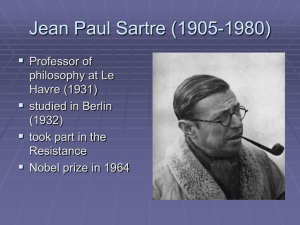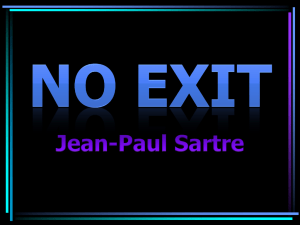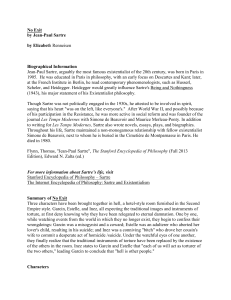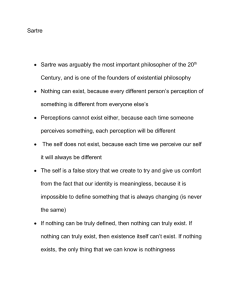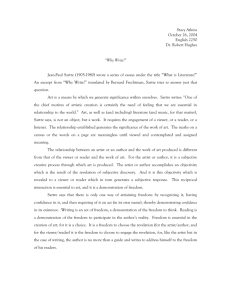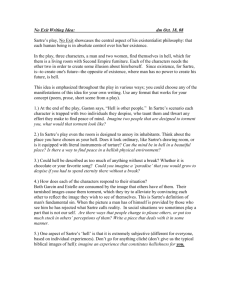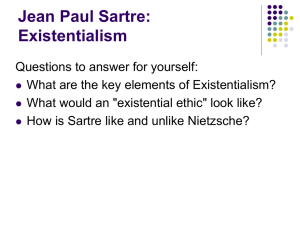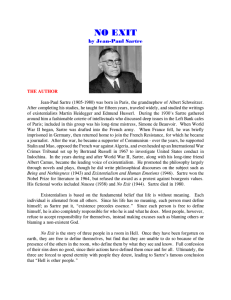No Exit - The Pearl Theatre Company
advertisement
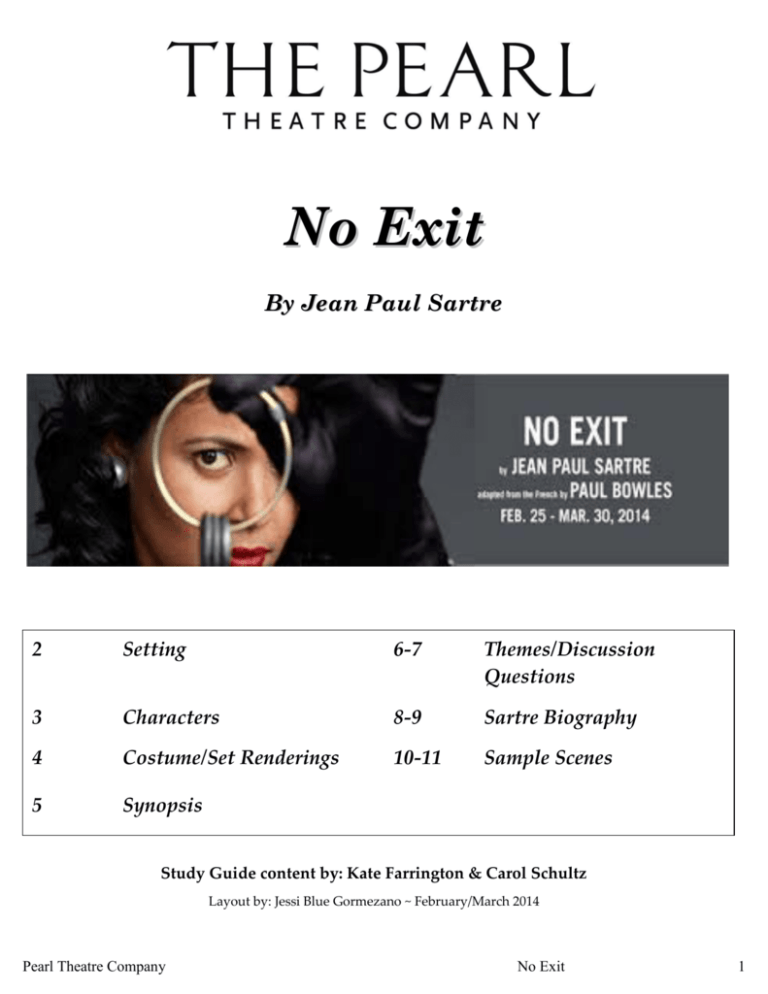
No Exit By Jean Paul Sartre 2 Setting 6-7 Themes/Discussion Questions 3 Characters 8-9 Sartre Biography 4 Costume/Set Renderings 10-11 Sample Scenes 5 Synopsis Study Guide content by: Kate Farrington & Carol Schultz Layout by: Jessi Blue Gormezano ~ February/March 2014 Pearl Theatre Company No Exit 1 No Exit A Play in One Act By Jean-Paul Sartre Adapted from the French By Paul Bowles Setting As described in script, to be used as inspiration for The Pearl’s Designers and Director: Sketch of No Exit set design by Harry Feiner A room. Sparsely furnished. Looks rather like a dentist’s waiting room. The room is set on a platform that rakes from back down stage. The walls slant outward from back to down stage and the ceiling rakes from middle stage to the back. There is a fireplace and mantel in Right wall; on the mantel are a statue of Cupid and a letter opener. The door is in Center of back wall. There is a window in the Left wall; when the curtains are opened we see that the window has been bricked up. A chandelier hangs Center from ceiling, there being a hole in the ceiling large enough for the chandelier to go through. There is a large ornate gold chair Down Center; a red divan Right and a green divan Left of Center chair. Brief Story of the Play Produced with great success in Paris, London and numerous other capitals of Europe, No Exit was first presented in New York at the Biltmore Theatre in 1945. Two women and one man are locked up together for eternity in one room in hell. The windows are bricked up; there are no mirrors; the electric lights can never be turned off; and there is no exit. Sartre wrote No Exit during the German occupation of Paris in World War II. He deliberately wrote it as a one-act play so that theatergoers would not be kept past the German-imposed curfew. Many forms of entertainment, including plays, had to be approved by German censors. During rehearsals, clearance to perform the play was given and taken away several times before the first performance in May 1944 just before the liberation of Paris. Sartre wrote philosophy both for philosophers and for lay people. Works aimed at scholars were typical philosophical books while works aimed at the people were plays or novels. All expressed the same basic ideas, but in different forms. In the original French, the play is called Huis Clos, which is the French equivalent of the legal term ‘in camera,’ referring to a private discussion behind closed doors. Pearl Theatre Company No Exit 2 Characters “Acting is a question of absorbing other people’s personalities and adding some of your own experience.” ~ Sartre “Acting is happy agony.” ~ Sartre Vincent Cradeau is the first to arrive. He is a journalist from Rio who was shot by a firing squad for attempted desertion. Cradeau is played by Bradford Cover. Inez Serrano arrives next. She was a postal clerk who was killed by her lover by leaving the gas on while Inez was sleeping. Inez is played by Jolly Abraham. Estelle Rigault is the third and final person to enter. She died of pneumonia. Estelle is played Sameerah Luqmaan-Harris. The Bellboy ushers the above three characters into their new environment. The Bellboy is played by Pete McElligot. Pearl Theatre Company No Exit 3 Costume Renderings by Devon Painter From left to right: Bellboy, Vincent Cradeau, Estelle Rigault, Inez Serrano Additional Set Design Sketches by Harry Feiner How does the designer honor the description found in the script? In what ways does he depart from the description? Pearl Theatre Company No Exit 4 Synopsis A bellboy and a man named Vincent Cradeau enter. Cradeau is surprised by the room’s appearance; he was expecting something very different. The two men converse about this place and throughout the play, we discover the rules: • • • • • • • The lights never turn off; it is broad daylight at all times. There is no sleep. There are no mirrors. There is a call-button, but it rarely works. There are no books or other forms of entertainment. There is a letter opener (but no letters) which can be used as a knife, but no one can be physically hurt. At times, residents can view what is happening on earth. Cradeau guesses about the methods of “torture.” The bellboy reveals that, beyond the door, there are simply more passages and more rooms. The bellboy excuses himself. Before he exits, he informs Cradeau that he can be summoned via the call-button, but that the call-button is temperamental and doesn’t always work. Cradeau is alone for a moment; and tries the bell which doesn’t work. He begins to panic when the door opens and in walks the bellboy, bringing with him Inez, a woman who is also supposed to stay in this room. The bellboy exits, leaving the two of them alone. Inez accuses Cradeau of being her torturer. Cradeau reveals that he’s not a torturer. He was a journalist and now they both seem to be in the same boat. While they try to find a way to proceed, the door opens again and the bellboy enters with a third person, Estelle. Estelle panics when she sees Cradeau, who has his head buried in his hands. She tells him not to look up, since she knows he has no face. When he looks up and reveals that he does have a face, she’s confused as he’s not the person she expected to see. Meanwhile Inez has taken an extreme interest in Estelle. Estelle is concerned with aesthetics. She wants to sit on a couch with a color to match her outfit. She wants a mirror to look at herself. She wants everyone to stare at her and confirm that she looks beautiful. Each of the three characters slowly reveal the story of their lives. Cradeau was a journalist in Rio who ran a pacifist newspaper. He was shot for standing up for his principles. Estelle was a poor girl whose parents died when she was young. She married a wealthy man three times her age to support her and her younger brother, became a society woman, and died of pneumonia. Inez was a postal worker. While they speak, each of the three envisions scenes of their lives back on earth. Cradeau watches his colleague talk about him to their friends. Inez watcher her old apartment get closed up and then rented Pearl Theatre Company No Exit 5 out to someone new. Estelle watches her friend, Olga, flirt with a boy who used to love her. All of them proclaim ignorance as to why they are in, what appears to be, hell. After awhile, the real stories come out. Cradeau was an adulterer who used to bring his mistresses home with him. His wife adored him, but he treated her badly. Estelle had an affair with a young man and got pregnant with his child. She fled to Switzerland so she could have the baby away from the sight of her husband, and then threw her infant off a cliff into the sea while her lover watched helplessly. Inez lived with her cousin and his wife, Florence. She slowly turned Florence against her husband and then took the woman for herself. Now that they’ve admitted why they’re in hell, they can start to understand what hell is about. It seems that each of them is meant to torture one of the others. The three of them find themselves “inseparable,” “inextricably linked.” On top of the “agony of the human mind,” they are allowed no respite from each other, as sleep and nighttime don’t exist here. Consumed with the absurdity of their situation, the three characters collapse into laughter as the play draws to a close. Themes Being Trapped – No Exit explores the idea of personal freedom. People are free to make choices in life but must accept responsibility for the consequences of their choices. In the play, the three characters must admit to their deeds and the pain they caused. In what ways could the characters have acted differently and had different outcomes to their situations? Are people always responsible for their own actions or could environmental issues be blamed? Is a person ever forced to commit an unethical act? In what ways do we trap ourselves in our own lives? Cradeau chooses to stay in the room even after he’s allowed to leave. Is Sartre saying that we are our own jailers? What keeps us from experiencing true freedom? “That woman was a born martyr, you know; a victim by vocation.” ~ Cradeau speaking about his wife Hell – Hell is many things in Sartre’s play. It is the drawing room into which the three principal characters are taken. It is the inability to sleep that will afflict them – the prospect of staying awake forever, tormented by the sins of their pasts. It is a “hell of the mind,” and it is, finally, “other people.” These characters are trapped not just physically, but emotionally and morally. Hell is both within them and outside of them, and either way, there is no exit. “So this is Hell. I never would have thought – You remember: being roasted on the spit, sulphur and brimstone. What a laugh! As if they needed it! Hell is just – other people.” ~ Cradeau Isolation – Even though the characters are in a room together, they are isolated from each other. How is it possible to be isolated even when you’re with other people? Is it possible to be even more isolated with other people than you are when you are alone? Do humans seek isolation or seek togetherness? Are we really isolated? Or do our words and actions affect others even if that is not our intention? Pearl Theatre Company No Exit 6 “Inez, they’ve got the wires hopelessly tangled. If you make the least gesture, if you lift your hand to fan yourself, Estelle and I feel it. No one of us can save himself alone. We’ve all got to lose everything together or save ourselves together. You can take your choice.” ~ Cradeau “And yet we’re in hell. And nobody else is coming. No one. We’re together, just the three of us, from now on.” ~ Inez The Nature of Existence – What does it mean to be alive? To be conscious? What is the meaning of our lives? “I feel so strange. Don’t you ever feel that way? When I can’t see myself in the mirror, I can’t even feel myself, and I begin to wonder if I really exist at all?” ~ Estelle “I can feel you right down to my bones. Everything you don’t say yells itself into my ears. You can nail your mouth shut, cut off your tongue, do you think that will keep you from existing? Do you think it will stop you from thinking? I can hear your brain going tick-tock like an alarm clock, and I know you can hear mine.” ~ Inez Discussion Questions 1. One of the most famous lines in the play is given by Cradeau, who says that “Hell is other people.” How is Hell other people? What does that mean? 2. Why doesn’t Cradeau leave when he finally has the opportunity? What is holding him there? 3. Sartre’s work is very much influenced by war, occupation and tragedy. No Exit (people who can’t stand each other forced to live in a room together) has been compared to living in Paris when the Germans occupied it. Do you notice the influence of war in Sartre’s writing? 4. Analyze the play’s title. Be sure to consider the original French: Huis Clos (In Camera). Does No Exit offer any hope? 5. Consider Inez’s question: “You always die too soon – or too late. You died too late. And there’s your life behind you, all finished. The figures are all there; they must be added up. What are you if not your life? Pearl Theatre Company No Exit 7 Biography of Jean-Paul Sartre Jean-Paul Charles Aymard Sartre, the best known philosopher of the 20th century, was born in Paris in 1905 to Jean-Baptiste Sartre, an officer of the French Navy, and Anne-Marie Schweitzer, cousin to the Nobel Prize laureate Dr. Albert Schweitzer. When Sartre was just fifteen months old, his father died of fever. Anne-Marie then moved back to her parents’ house and raised Sartre with help from her father, a tough German high school professor who taught Sartre music, mathematics and classical literature at a very early age. When Sartre was twelve, his mother married an engineer at the naval yards in La Rochelle. There young Sartre suffered under his controlling stepfather, whom he called an “intruder.” Sartre was frequently bullied in school. Such experiences shaped his character to rebel against any restrictions and domination. As a teenager in the 1920’s, Sartre was interested in philosophy. He earned a degree in philosophy at the École Normal Supérieure, where he met his lifelong companion, Simone de Beauvoir, who also became a celebrated philosopher, writer and feminist. Both of them learned to hate the restrictions of upper-class life, and favored an “authentic state of being.” In 1932, Sartre proposed to Beauvoir. She turned him down although they remained partners in an “open relationship,” living a very modest life together in a small apartment in Paris. Although the two were never monogamous, they were devoted to each other and share a grave. He was awarded the Nobel Prize in Literature in 1964 for his work which, rich in ideas and filled with the spirit of freedom and the quest for truth, exerted a far-reaching influence on the world. But he refused it (as he did several other honors), saying that he always declined official honors and that “a writer must refuse to allow himself to be turned into an institution.” Sartre was a professor of philosophy when he joined the French Army at the outbreak of World War II. Captured by the Germans, he was released, after nearly a year, in 1941. He immediately joined the French resistance as a journalist. His existentialist philosophy, proposes no god, no ethic, no moral, and was meant to be a cleansing of the old secular values, where god is replaced by human free will and responsibility. As a baby he was baptized Catholic; but saw religion as a prison. Although this position was always evolving with Sartre; and towards the end of his life he did come to adapt some religious viewpoints. Pearl Theatre Company You Never Can Tell 8 Despite his philosophy, he always claimed that religious belief remained with him – perhaps not as an intellectual idea but rather as an emotional commitment. He used religious language and imagery throughout his writings and tended to regard religion in a positive light. In the postwar era, Jean-Paul Sartre became one of the most influential men of this century. He died in Paris in 1980. After his death, thousands spontaneously joined his funeral procession in a memorable tribute to his respect and esteem among the French people. The headline of one Parisian newspaper proclaimed, “France has lost its conscience.” Paul Bowles (translator) – (1910-1999) American expatriate composer, author and translator. Born and raised in New York City; made many trips to Paris after his University of Virginia education; eventually settling in Tangier, Morocco. Married to the author, Jane Bowles. Pearl Theatre Company No Exit 9 Sample Scenes Cradeau and Bellboy Cradeau: Where are the thumbscrews? Boy: What? Cradeau: The thumbscrews, the whips, the racks? Boy: Are you serious? Cradeau (Looking at him): Ah? Oh, good. Yes, I was serious. (Silence; he walks about. With sudden violence) No mirrors, no windows, of course. Nothing breakable. (With sudden violence) And why’d they take away my toothbrush? Boy: Aha! There’s your human dignity coming back! Cradeau (Pounds angrily once on the back of the divan): Save your familiarity, my friend. I know where I am and I know why I’m here, but I’ll be damned if I’m going to stand for – Boy: Take it easy. No harm meant. But what do you expect, all the guests ask the same thing. Right away they ask: “Where’s the thumbscrews?” And when they say that, I can tell you they’re not thinking about that Pepsodent smile of theirs. Then you get ‘em calmed down, and about that time they start wanting their toothbrush. Now all I ask is, just stop and think: why in hell would you want to brush your teeth here? Cradeau (Quieted): Yes, I suppose that’s true. Why should I? (Looks around) And why would I want to look in the mirror? As far as the statue goes, fine. There’ll probably be plenty of times when I won’t be able to look at it enough. (Working himself up) Not enough, see? What the hell, there’s nothing to hide. I tell you I’m quite aware of my status here. And why I was sent. Do you want to know what it’s like to be here? Is that why you were looking at me like that? All right, I’ll tell you. It’s like drowning in hot water, with your eyes above the water. (Whirls about to face mantel) And what do you see? A statue of Napoleon! (Pause) What a nightmare! (Pause) That’s all right, you don’t have to say anything. You’re probably not allowed to, anyway. I know, I’ll shut up. But just don’t think it’s a shock to me. I knew what was coming. I know the whole score backwards and forwards, behind me and ahead of me. (He begins walking again. Reflectively) So it’s no toothbrush. No beds either. You never sleep, right? Boy: Right. Cradeau: I was sure of it! Why would you sleep anyway? You feel sleepy, it creeps up on you behind the ears first. You feel your eyes shutting, but – sleep? You lie down on the couch, and – fttt! All gone, you’re not sleepy anymore. You have to rub your eyes, get up and go through the whole thing over again. Boy: You’ve got some imagination. Cradeau: Shut up. I’m not going to make any fuss; I just want to look the whole thing straight in the face. I don’t want to give it a chance to knife me from behind where I can’t see it. Imagination? Well, Pearl Theatre Company No Exit 10 then, how’s this? You don’t get sleepy. Why sleep if you’re not sleepy? Correct. Wait a minute, wait a minute! I’ve got it! Why is it painful to be here? Why would it naturally have to be torture? I’ve got it! Just because it’s life without time off, without a break. Inez and Estelle (Cradeau is present but is trying not to listen, speak or participate) Inez: What’s the matter? Estelle (Opens her eyes and smiles): I feel so strange. (She runs her hand feebly over her body) Don’t you ever feel that way? When I can’t see myself in the mirror, I can’t even feel myself, and I begin to wonder if I really exist at all. Inez (Looking fixedly at her): You’re very lucky. I always feel myself inside. (Sits) Estelle: Oh, yes, inside – Everything that goes on in one’s head is so vague it puts me to sleep. (A pause) There are six huge mirrors in my bedroom. I can always see them but they can’t see me. They reflect the couch, the rug, the window. How empty it is, a mirror, if I can’t see myself in it! Whenever I had to talk to anyone, I always arranged it so that I could see myself in one. I talked and I could see myself talking. I could see how I looked to other people and that sort of kept me awake. (Desperately) My make-up! I’m sure I’ve put it on all wrong – I simply can’t go on through all eternity without a mirror! Inez (All this as if to a child again): Wouldn’t you like me to be your mirror? Come, I invite you over to my house. (Indicating place on divan Right) Sit down on my divan. Estelle (Pointing to Cradeau): But – Inez: We won’t pay any attention to him. Estelle (Rising; fearfully): We’re going to hurt each other. You said so yourself. Inez: Do I look as if I wanted to hurt you? Estelle (Hesitantly): You never know. (Crosses to sit Right of Inez) Inez: It’s you who’ll hurt me. But what does it matter? If I’ve got to suffer, it might as well be because of you. Sit down. Closer. Come over here closer to me. Look into my eyes. What do you see? Estelle: I see myself very tiny. I can hardly see myself. Inez: I see you. All of you. Ask me questions. You’ll see no mirror could be so faithful. For further research, including an interview with Sartre, www.sartre.org Pearl Theatre Company No Exit 11

